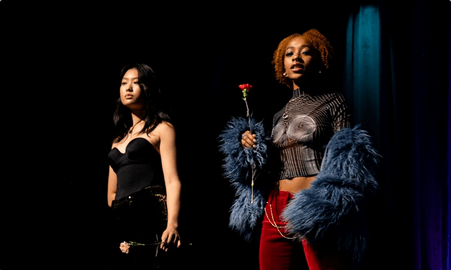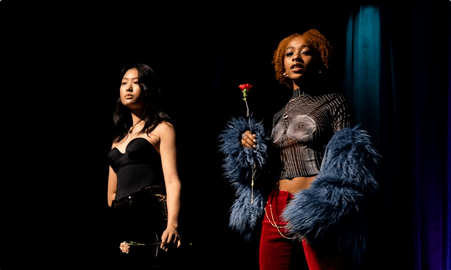On Friday, February 9th, the Environmental Affairs branch of UNC Undergraduate Student Government will host the second annual Sustainable Strut, a student-based fashion show designed to highlight the importance of ethical, eco-friendly clothing. The goal of the event, which will be held at the Ackland Art Museum at both 6 pm and 7:30 pm, is to showcase how people can be both stylish and sustainable in their fashion choices.

The Sustainable Strut is a student-based fashion show that showcases clothing that has been cultivated sustainably and ethically. The show will feature a large group of student fashion organizations and designers.
The show will feature student models wearing pieces provided by student-designers and organizations that promote sustainable fashion. We spoke to Aliyah Carrion, a junior at UNC and the creator of the Sustainable Strut, about the event. (Other organizers include Ella Feathers, Tyra Rubin, Christian Chung, Abby Coursey, Shavashti (Vash) Mercer, and Lila Yackee.)
How did you come up with the idea for the Sustainable Strut?
The concept of the Sustainable Strut came to life in fall of 2022 when I first joined the UNC Undergraduate Student Government – Environmental Affairs branch. Alongside Ella Feathers, our branch was brainstorming ideas to increase engagement with the student body through different events.
I wish I could explain what gears turned in my head to give me this idea, but it was deeply inspired by several factors. In August of 2022, I lost my niece unexpectedly. This grief took a toll on me in many ways, but it really took a toll on my perception of myself. However, what really got me to feel like myself again was going out to the thrift with my friends Helena and Kira.
Thrifting was always a huge part of my life growing up in a low-income family, so this was very full circle for me. When I started to piece together these outfits that I knew nobody else had done before, it was like a sense of becoming for me. The great beauty in things that may not be perceived as beautiful to others was truly what helped me overcome this loss, because that echoed the sentiment I shared as I was grieving. I still grieve for my niece, but I grieve for her spirit with smiles, art and charisma. Grief is not beautiful for everyone, but my grieving taught me a great deal about myself. So, I thank my niece, Nevaeh, for giving me the courage to let my creative spirit unleash its true potential.
Aside from thinking creatively, the Strut came to life as an act of climate activism. We are all consumers, and we all [hopefully] recognize that our consumer motivations can be wildly problematic for the environment. While some think there’s nothing [that] they themselves can do to solve this widespread problem, I challenge them to rethink their impact with the clothes they wear every day.
The Strut challenges its viewers to rethink their consumer ideologies and fascination with trends. Our goal is to raise impact to not only environmental injustice in the fashion industry, but the mistreatment of garment workers in large sweatshops home to most fast fashion platforms. While the show embodies a positive sense of community – it is also equally a cry out for society to rethink their impact.
What do you mean by sustainable? How are the outfits designed that the students will wear?
By ‘sustainable’ fashion, we refer to clothing created and maintained under conditions in which humans and nature can exist in productive harmony to support present and future generations. The pieces worn by our models are either handmade, up-cycled, or otherwise obtained from sustainable sources or local businesses. Student designers often create pieces that relay a certain message, aesthetic, or cause that speaks to them personally.
What’s the best way for students and others in our community to change their buying habits?
There are many alternatives to supporting fast fashion/shopping unsustainably. For example, thrifting can be a fun experience where one can find unique, pre-worn articles of clothing and give them a new life.
Similarly, upcycling, the practice of repurposing used clothes, whether it’s through sewing, dyeing, cutting, or other artistic methods, is a creative and more sustainable option when cultivating one’s individual wardrobe.
Additionally, doing simple research into the values and practices of the brands we consider supporting is one of the best ways to educate ourselves and make informed decisions.
What do you hope the outcome of the show is?
Our whole team has put so much time and effort into this show, so we hope that the event is as inspiring to the audience as it was for us to create. We hope that people come away with a new sense of motivation to explore the creative side of fashion and choose to shop sustainably going forward.
How can people learn more about sustainable clothing in Chapel Hill and Carrboro? Are there any local / national groups to get involved with?
We worked with multiple local groups to help bring the Sustainable Strut to life- including Xpressions UNC, Coulture Magazine, and Carolina Thrift. These groups provide a unique look into student creativity and fashion, while emphasizing sustainability and inclusion. People can learn about these local groups by visiting their respective social media pages, websites, or by coming to the Sustainable Strut!
Can you speak a little about fast fashion and its impact on climate / sustainability?
Fast fashion refers to a business model that cheaply and quickly produces large amounts of apparel that match the latest fashion trends in order to make the most profit possible.
This practice is extremely harmful not only in terms of environmental degradation (through over-consumption of fossil fuels, water, and unsustainable textiles, and promoting cycles of waste), but also in its exploitation of employees who are forced into unhealthy work conditions for long periods of time and receive insufficient compensation.
Examples of today’s top fast fashion brands include: Shein, H&M, Zara, and Forever 21. These brands are easily accessible, surprisingly affordable, and are always up to date with the latest trends- which is why they are so popular with consumers, especially Gen-Z.

